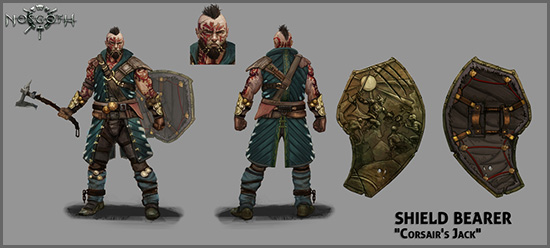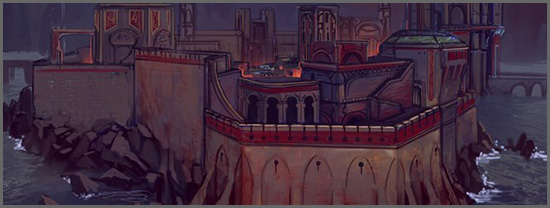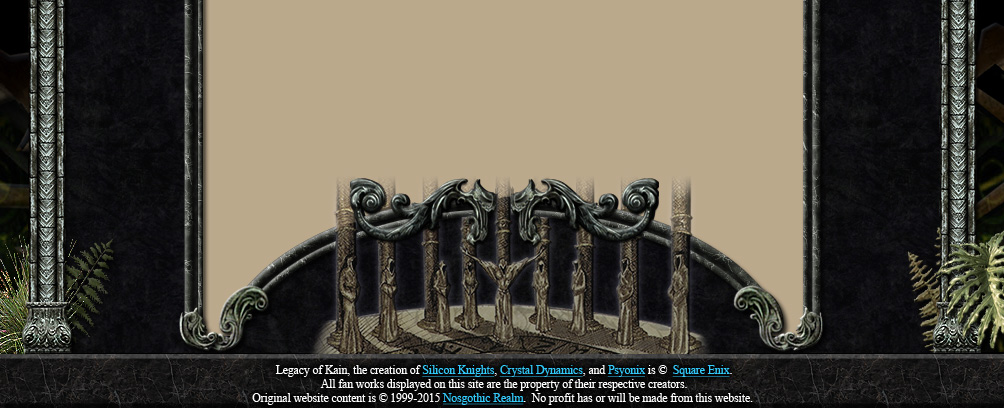Battalions of tough warriors founded by a mixture of convicts and overseers who together survived the Vampire assault on the Isle of the Dead. The Drowning Men now attract the lost and the damaged and the wicked from throughout the war-ravaged Human settlements of Nosgoth. Criminals, deserters, pirates, battle-scarred veterans, blood-soaked priests and haunted medics stand together as a bulwark against the Vampire hordes.

The city of Meridian has its darker side: wherever people gather in numbers, there will be some of their own kind to prey on them. Conmen, thieves, robbers, slavers, rapists, murderers – Humanity has always been capable of cruelty to itself in ways which can make a Vampire’s hunger look simple by comparison. As Meridian rebuilt itself all manner of villains were among those who swelled its population, and as their Vampiric former overlords busied themselves fighting among themselves, the criminals of Meridian returned to their old ways.
In time, the problem became such that the Chancellor of Meridian was forced to act. Squads of watchmen swept through the slums and smugglers dens, snatching up anyone suspected of wrong-doing. If a few so-called innocents were caught up in the watchmen’s nets, this was a price deemed worth paying.
Human lives – even those of this kind of scum – were too precious to sacrifice, so the prisoners were pressed into work-gangs to help with the ongoing reconstruction and repair of the city. However after a series of murderous escape attempts and lethal attacks on their guards, some prisoners were recognised as too dangerous to be allowed out in public like this. Chancellor Speyr needed a new solution, and the Patriarch of the Waters provided one.
The mountain ranges and the sea which protected Meridian had also in the past isolated the city from the rest of Nosgoth, and as a result unique traditions and beliefs had long-ago sprung up here. Whereas elsewhere Humans consigned their dead to the pyre-churches to return them to the embrace of the obscured Sun, here in Meridian the superstition that the dead would be desecrated by Vampires had long ago led to them being consigned to the sea instead. The ocean graveyards of Meridian, stretching between the peninsulas and sandbanks known as the Witches’ Fingers, provided a safe haven for the shrouded and weighted bodies of the city’s dead. A church of equal parts clerics, professional mourners, and boatmen - revered and yet shunned for their contact with the dead – worked in this industry. Their black barges would berth at the city’s docks to take on a fresh load of the deceased, ferry them to their undersea resting place, and then row back to their fortress-monastery on the Isle of the Dead. Here the Patriarch of the Waters could find a use for the worst of the criminals the Chancellor could provide.
Chained to their oarsmen’s seats in the black barges, or manacled in the mortuaries where the dead were ritually gutted and then wrapped in their funeral shrouds and chains, the prisoners began new lives of service to the dead. They lived, slept, and died in their fetters. Those on the Isle of the Dead never left it, and even if they had managed to break free were trapped on a rock a mile from the shore with the dark waters in-between infested with the sacred predators known as the Eaters of the Dead. Those on the barges were constantly watched by overseers, whose heavy shields formed a wall between the oarsmen and the city whenever they made landfall. Over time the convicts came to be the source of their own superstitions and have their own title – the Drowning Men.
Then came the war with the Vampires. As the Vampire armies laid siege to Meridian’s outer defences, anything that lay outside the causeways was left to care for itself and so swiftly overrun and destroyed. For a time the seas kept the Isle of the Dead safe. From its squat towers the new Patriarch of the Waters watched the fires spread along the shoreline, creeping closer to the city itself. He and his followers had been abandoned, but were safe at least: until the Razielim arrived at the siege. While the archers and artillerists of the city could pose a warding danger to these winged Sentinels, the Isle of the Dead had no such protection. A flight of the Razielim swooped on its isolated defenders.
The watching Patriarch Ancellas was plucked from his tower-top vantage point and dashed on the cliffs below. Panicking priests and scribes were easy prey for the Vampires. The overseers, led by their Marshal-at-Arms Torstein, retreated to the most defensible positions: the mortuaries carved into the rock beneath the fortress-monastery. Here the Drowning Men waited and listened to the muffled sounds of slaughter overhead. In the torch-lit vaults the overseers and convicts came face-to-face in the realization that their mutual end was terrifyingly close.
When the first of the Razielim broke through the mortuary doors he was instantly cut down by a hail of thrown hand-axes and butchers’ tools. The second was swept from his feet by a flailing length of chain swung by the tattooed mass-murderer Gerik, and his skull cracked open against the flagstones by the crushing weight of Marshal Torstein’s tower shield. The shield-wall pushed forward to drive their enemy back and block the doorway again. There in the semi-darkness the Humans and Vampires struggled and fought and died, one of the countless small battles almost lost against the grand scale of the slaughter elsewhere.
When this fight was over, it was Humans who emerged blinking from the shadows into the fire-lit fresh air. When the black barges rowed away from the Isle of the Dead for the final time, before putting ashore at a secret smuggler’s dock to let their crews creep through the sewers to meet with the defenders of Meridian, the men aboard no longer called themselves convict or overseer. They were now all equals, all survivors, all Drowning Men. In return for their freedom they would join the defenders but it would be on their terms, and they would recruit accordingly.
With the struggle for Meridian acting as a beacon, fighters from across Nosgoth made their way to boost the ranks of its defenders. Ships proved the best way to circumvent the besieging forces of the Vampires, and the docks became increasingly busy bringing in men and supplies. New arrivals were picked over by the elite units for suitable candidates, but some among them would never be chosen even in these desperate times, or were already determined about where their destiny lay. The story of the Drowning Men had spread, and had particular resonance for some of its audience. Last survivors of decimated units; suddenly guilt-stricken former deserters and escapees from penal battalions; pirates and smugglers determined to protect their way of life; criminals looking to escape punishment for prior wrong-doings; initiates of militaristic mystery cults looking for new secrets; battle priests questioning their faith among the horrors of war; field medics who now heard the voices of all the dead when they tried to sleep at night… When the regimental discipline of the Iron Guard and the self-discipline of the Watchers offered no appeal or welcome, the Drowning Men drew in the lost and the damaged and the wicked and gave them a new home. Together they would be a bulwark against the Vampire hordes.












